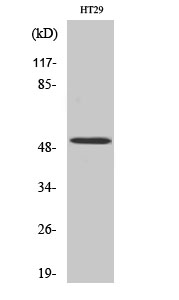
| WB | 咨询技术 | Human,Mouse,Rat |
| IF | 咨询技术 | Human,Mouse,Rat |
| IHC | 1/100-1/300 | Human,Mouse,Rat |
| ICC | 技术咨询 | Human,Mouse,Rat |
| FCM | 咨询技术 | Human,Mouse,Rat |
| Elisa | 1/10000 | Human,Mouse,Rat |
| Aliases | HNF4A; HNF4; NR2A1; TCF14; Hepatocyte nuclear factor 4-alpha; HNF-4-alpha; Nuclear receptor subfamily 2 group A member 1; Transcription factor 14; TCF-14; Transcription factor HNF-4 |
| Entrez GeneID | 3172; |
| WB Predicted band size | 52kDa |
| Host/Isotype | Rabbit IgG |
| Antibody Type | Primary antibody |
| Storage | Store at 4°C short term. Aliquot and store at -20°C long term. Avoid freeze/thaw cycles. |
| Species Reactivity | Human,Mouse,Rat |
| Immunogen | Synthesized peptide derived from human HNF4-α around the non-phosphorylation site of S313. |
| Formulation | Purified antibody in PBS with 0.05% sodium azide,0.5%BSA and 50% glycerol. |
+ +
以下是3篇关于HNF-4α抗体的参考文献及其摘要内容:
1. **"Hepatocyte Nuclear Factor 4α (HNF4α) regulates cell proliferation and fetal liver development in mice"**
- **作者**: Hayhurst, G.P., Lee, Y.H., Lambert, G., Ward, J.M., Gonzalez, F.J.
- **摘要**: 该研究利用HNF-4α特异性抗体通过免疫组化和Western blot技术,揭示了HNF4α在小鼠肝脏发育中的关键作用,发现其缺失导致肝细胞增殖异常及胚胎期肝功能衰竭。
2. **"Tissue-specific regulation of gene expression by HNF4α in pancreatic β-cells and hepatocytes"**
- **作者**: Stoffel, M., Duncan, S.A.
- **摘要**: 通过ChIP-seq和免疫荧光技术结合HNF4α抗体,研究揭示了HNF4α在胰腺β细胞和肝细胞中的组织特异性调控网络,表明其通过结合靶基因启动子区域影响糖代谢相关基因表达。
3. **"Loss of HNF4α in hepatocellular carcinoma correlates with promoter methylation and poor prognosis"**
- **作者**: Ning, B.F., Ding, J., Yin, C., et al.
- **摘要**: 使用HNF4α抗体进行免疫组化分析,发现肝癌组织中HNF4α表达显著降低,其启动子甲基化与患者预后不良相关,提示HNF4α作为肝癌潜在生物标志物的价值。
以上文献均聚焦于HNF4α抗体在功能研究及疾病机制中的应用,涵盖发育生物学、代谢调控及肿瘤学领域。
Hepatocyte Nuclear Factor 4-alpha (HNF-4α) is a transcription factor belonging to the nuclear receptor superfamily, primarily expressed in the liver, pancreas, intestines, and kidneys. It plays a critical role in regulating tissue-specific gene expression, particularly genes involved in glucose, lipid, and drug metabolism, as well as embryonic development. HNF-4α functions by binding to DNA response elements as a homodimer, often interacting with coactivators to modulate target gene transcription. Dysregulation of HNF-4α is linked to metabolic disorders (e.g., maturity-onset diabetes of the young, MODY1) and cancers (e.g., hepatocellular carcinoma).
HNF-4α antibodies are essential tools for studying its expression, localization, and molecular interactions. These antibodies are generated using immunogenic peptides or recombinant proteins, often validated for applications like Western blotting, immunohistochemistry (IHC), immunofluorescence (IF), and chromatin immunoprecipitation (ChIP). Specificity is confirmed using knockout controls or siRNA-mediated depletion. Commercially available antibodies typically target conserved regions (e.g., N- or C-terminal domains) and may distinguish between isoforms (e.g., HNF-4α1 vs. α2). Researchers rely on these antibodies to investigate HNF-4α's role in disease pathogenesis, drug response, and cellular differentiation, making them indispensable for both basic research and clinical diagnostics.
×